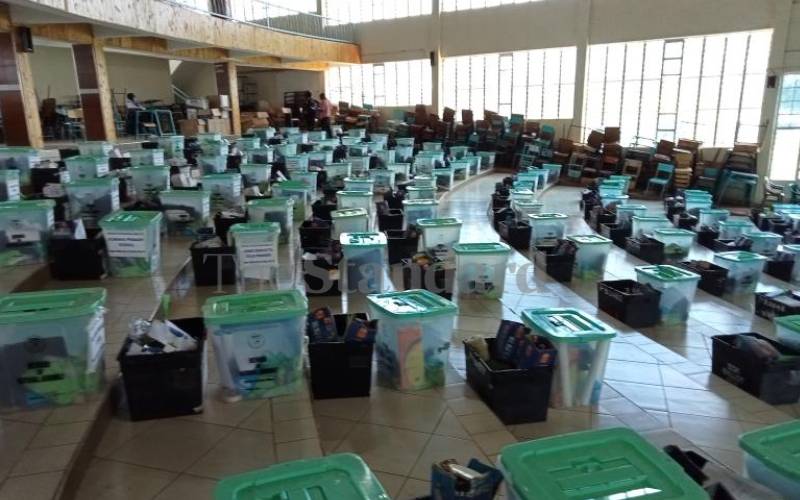
Voting materials. [Fidelis Kabunyi, Standard]
With the crowning of former Prime Minister Raila Odinga as Azimio’s flagbearer, it is clear that this election will be a Raila-Ruto face off come August 9 next year.
The earlier the remaining presidential hopefuls align with one of the other of the two candidates, the better. I say that recognising that standing for election is sometimes a matter of principle. I, therefore, expect that gospel singer and Christian apologist Reuben Kigame will be on the ticket.
I also expect my friend and former teacher Prof Kivutha Kibwana to throw his hat in the race. I wish them well and I hope that, at the very minimum, they will force the country into principled discourse about our expectations on the elections and the future of Kenya.
That said, this will be an election like no other. As I have said before, we have no template against which to predict voter behavior in 2021 and we may well be in for some sobering shocks.
READ MORE
Matiang'i jets back to the country amid speculation over presidential ambitions
Who is Tundu Lissu, Tanzania's defiant opposition figure?
Ombudsman seeks answers on six candidates sneaked in IEBC interviews
The one thing we must agree as a country is that our electoral process must continually improve to the extent that even the losers accept them as reflective of the voter’s will. As the countdown towards the elections commences, there are, however, some conduct we must avoid so that this acceptance becomes a possibility.
The first is over politicising the public service. It is understandable that the President, being politician numero uno will engage in partisan politics. It is also naïve to expect ministers, who are political appointees, not to engage in a level of politicking. Good sense dictates that even they be very measured.
What is untenable is members of constitutional commissions, Permanent Secretaries, provincial administration and senior bureaucrats to be on the campaign trail for one or other candidate. By the nature of their job, they should be apolitical. They must give confidence that they will serve whichever government is elected by Kenyans.
When the public see public officers using their offices and public resources to game the system to benefit a candidate, it contaminates the election. The second area is the IEBC.
We need to see absolute transparency and fairness in their conduct concerning the elections. Transparency in procurement of key electoral equipment and other supplies.
Transparency and fairness in the recruitment of key electoral officials. Fairness in the application of their numerous rules. To this end, IEBC will need to identify partners, including the media, which it can allow into its inner sanctums and who can therefore affirm the integrity of its decisions when the difficult moments come around the 12th of August next year.
A credible election also needs technical integrity. The debacle of the first presidential elections in 2017 was not in the substance of the elections; it was in the bungling of basic components of the electoral process, especially the electronic transmission system.
With limited information available, with insufficient or contradictory communication, it was easy for those who needed the integrity of the elections questioned to implement their agenda.
It is only when the government officers are seen to act in a non-partisan manner, and IEBC delivers a technically credible election that we can legitimately ask politicians to accept results even if they lose.
But even if the process is compromised, losers must commit to use the courts as the sole determinants of their electoral fate. They must commit not to whip up the emotions of their gullible supporters who will be willing to rise against their own neighbour for the politician’s cause.
Growing a democracy is painful. It includes allowing institutions to make decisions and abiding by them, even if we do not agree. That is true leadership. Failing that, we will eventually be no more than a banana republic.

